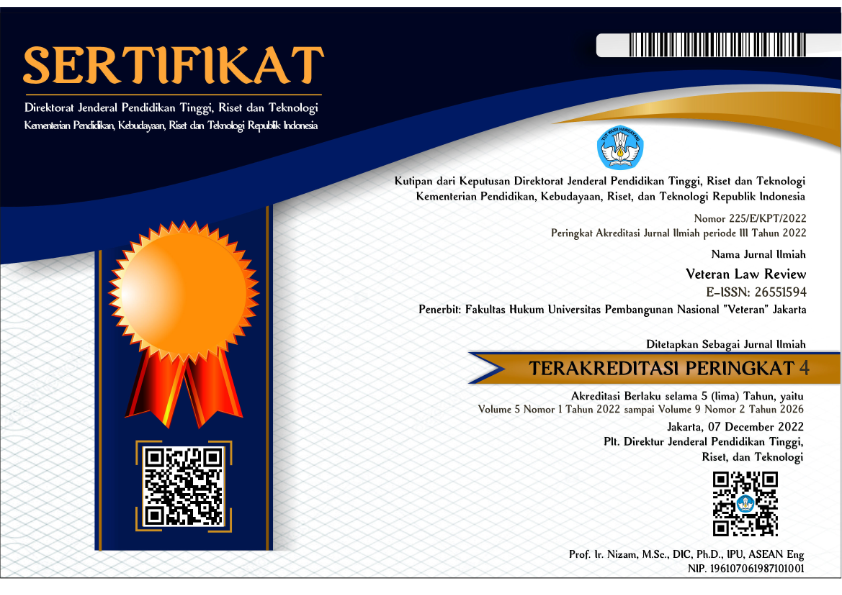Legal Facts in Legal Opinions Formulation on The Decisions of Islamic Civil Case
DOI:
https://doi.org/10.35586/velrev.v6i1.4629Keywords:
Legal Opinion, Legal Facts, Islamic Civil CaseAbstract
Development of Islamic civil cases today, the problems that arise in society are increasingly complex and the public's need for services in the legal field is getting higher. This does not escape the need for legal opinions from experts such as lawyers, advocates, or legal advisors. This legal opinion is what we often call a legal opinion. In practice, the determination of a punishment must be fair. To realize this justice, the law enforcers should be impartial and consider many things before deciding on a sentence or giving a legal opinion. The weighing of these decisions can be done by looking at the facts that happened and studying them, presenting witnesses, and so on. Legal facts are one of the processes that cannot be overlooked by persons investigating a case, because if this process is missed or not thorough enough, it can affect a decision. The method used in this study is a qualitative juridical normative method. This study aims to find out that legal facts will affect the decisions of Islamic civil law that will be taken and legal opinions that will be made by a legal expert. The result of the study is that Legal facts are important to note because the discovery and analysis of legal facts can support and complete the clauses that will be included in the legal opinion and the decisions that will be handed down by the judge on the defendant. Although in the civil law rules there is no information about the importance of legal facts in legal opinions, if viewed from the facts that occur, it can be identified as a legal risk that will be accepted by the client.
Downloads
References
Adnyani, N. K.S., & G. S.M. Dewa. (2019). “Business Actors’ Responsibility Towards Consumers Due To Defective Product”. Veteran Law Review. 2(2).
Aris, and Muhammad Sabir. 2020. “Hukum Islam Dan Problematika Sosial; Telaah Terhadap Beberapa Hukum Perdata Islam Dalam Kompilasi Hukum Islam Di Indonesia”. Diktum: Jurnal Syariah Dan Hukum. 18(2).
Badriyah, Siti Malikhatun. (2011). “Penemuan Hukum (Rechtvinding) dan Penciptaan Hukum (Rechtsschepping) Oleh Hakim Untuk Mewujudkan Keadilan”. Masalah-Masalah Hukum. 4(3).
Dermawan, Marchellino, (Skripsi). (2020). Perlindungan Hukum Terhadap Profesi Advocate Dalam Memberikan Jasa Hukum Pendapat Hukum (Legal Opinion) Dihubungkan Dengan Undang-Undang Nomor 40 Tahun 2014 Tentang Perasuransian. Bandung: Universitas Komputer Indonesia.
Harahap, M Yhaya. (2003). Pembahasan Permasalahan dan Penerapan KUH: Pemeriksaan Sidang Pengadilan, Banding, Kasasi, dan Peninjauan Kembali. Jakarta: Sinar Garfika.
Hardani, and Nur Hikmatul Auliya. 2020. Metode Penelitian Kualitatif dan Kuantitatif. Yogyakarta: CV. Pustaka Ilmu Group.
https://www.liputan6.com/showbiz/read/755817/asmirandah-ajukan-batal-nikah-karena-jonas-rivanno-berbohong, Retrived 15 Jun 2022 Pukul 20:00 WIB.
https://imcnews.id/read/2022/06/14/19876/10-bulan-nikah-siri-nur-aini-tak-sadar-dinikahi-sesama-perempuan/, Retrived 30 Jun 2022 Pukul 20:00 WIB.
Manan, Abdul. (2017). Aneka Masalah Hukum Perdata Islam di Indonesia. Jakarta: Prenada Media.
Manggalatung, A. Salman. (2014). “Hubungan Antara Fakta, Norma, Moral, dan Doktrin Hukum Dalam Pertimbangan Putusan Hakim”. Jurnal Cita Hukum. 2(2).
Muchladun, Wildan. (2015). “Tinjauan Yuridis Terhadap Tindak Pidana Pencemaran Nama Baik”. Jurnal Ilmu Hukum dan Legal Opinion. 3(6).
Muqorobin, Ahmad. (2021). “Interreligious Marriage and Its Validity In Indonesian Marriage Law Jurisprudence Analysis”. Al-Ahwal: Jurnal Hukum Keluarga Islam. 14(2).
Muqorobin, Ahmad, and Usamah Abdurrahman. (2022). “The Internalization of Anti-Corruption Values as Hidden Curriculum in Gontor Educational System”. Nadwa: Jurnal Pendidikan Islam. 15(2).
Priyono, Ery Agus, and Kornelius Benuf. (2020). “Kedudukan Legal Opinion Sebagai Sumber Hukum”. Jurnal Suara Hukum. 2(1).
Presiden Republik Indonesia. (1974). Undang-Undang Republik Indonesia Nomor 1 Tahun 1974 Tentang Perkawinan. Jakarta: Istana Negara.
Retnowati, May Shinta et al. (2022). “Eksistensi Peran dan Fungsi Legal Opinion Dalam Menyelesaikan Masalah Hukum”. Ijtihad : Jurnal Hukum dan Ekonomi Islam. 16(1).
Retnowati, May Shinta. (2022). “The Dimensions of Legal Opinion’s Role in Settlement of Civil Law Cases”. Legal Brief. 11(2).
Saepullah, Asep. (2018). “Peranan Alat Bukti Dalam Hukum Acara Peradilan”. Mahkamah : Jurnal Kajian Hukum Islam. 3(1).
Sasangka, Hari, and Lily Rosita. (2003). Hukum Pembuktian Dalam Perkara Pidana. Bandung: Mandar Maj.
Sitorus, Syahrul. (2008). “Pendapat Hukum (Legal Opinion) Dan Uji Kepatutan Dari Segi Hukum (Legal Due Siligence)”. Jurnal Hikmah. 15(2).
Suraputra, D. Sidik. (2005). “Pendapat Hukum Dalam Transaksi Komersial”. Jurnal Hukum dan Pembangunan. 35(2).
Tjoneng, A., Basani, C.S., & Sintia, V. (2020). “Implementation LawIssues Of Supreme Court Regulation No. 4Of 2019 About Perma Revision No. 2 Of 2015 About Small Calim Court ResolutionProcedures And Its Settlement Efforts”.Veteran Law Review. 3(2).
Downloads
Published
How to Cite
Issue
Section
License
Copyright (c) 2023 Veteran Law Review

This work is licensed under a Creative Commons Attribution-ShareAlike 4.0 International License.
Copyright (c) 2022 Veteran Law Review Journal
Veteran Law Review © 2022 by Faculty of Law Universitas Pembangunan Nasional "Veteran" Jakarta is licensed under Creative Commons Attribution 4.0 International

1. License
The non-commercial use of the article will be governed by the Creative Commons Attribution license as currently displayed on Creative Commons Attribution 4.0 International.
2. Author(s)' Warranties
The author warrants that the article is original, written by the stated author(s), has not been published before, contains no unlawful statements, does not infringe the rights of others, is subject to copyright that is vested exclusively in the author, and free of any third party rights, and that any necessary written permissions to quote from other sources have been obtained by the author(s).
3. User/Public Rights
VELREV's spirit is to disseminate articles published are as free as possible. Under the Creative Commons Attribution-ShareAlike 4.0 International License. VELREV permits users to copy, distribute, display, and perform the work for non-commercial purposes only. Users will also need to attribute authors and VELREV to distributing works in the journal and other media of publications.
4. Rights of Authors
Authors retain all their rights to the published works, such as (but not limited to) the following rights;
- Reproduce the work
- Prepare derivative works based upon the work
- Distribute copies of the work
- Perform the work publicly
- Display the work publicly
- Copyright and other proprietary rights relating to the article, such as patent rights,
- The right to self-archive the article,
- The right to enter into separate, additional contractual arrangements for the non-exclusive distribution of the article's published version (e.g., post it to an institutional repository or publish it in a book), with an acknowledgement of its initial publication in this journal (Veteran Law Review).
5. Co-Authorship
If the article was jointly prepared by more than one author, any author submitting the manuscript warrants that he/she has been authorized by all co-authors to be agreed on this copyright and license notice (agreement) on their behalf, and agrees to inform his/her co-authors of the terms of this policy. VELREV will not be held liable for anything that may arise due to the author's internal dispute. VELREV will only communicate with the corresponding author.
6. Royalties
Being an open accessed journal and disseminating articles for free under the Creative Commons license term mentioned, author(s) are aware that VELREV entitles the author(s) to no royalties or other fees.
7. Miscellaneous
VELREV will publish the article (or have it published) in the journal if the article’s editorial process is successfully completed. JOSI's editors may modify the article to a style of punctuation, spelling, capitalization, referencing, and usage that deems appropriate. The author acknowledges that the article may be published so that it will be publicly accessible and such access will be free of charge for the readers as mentioned in point 3.

















